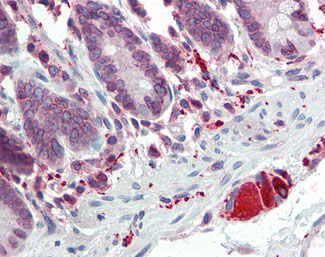TLR7 Antibody (aa706-728)
Rabbit Polyclonal Antibody
- SPECIFICATION
- CITATIONS
- PROTOCOLS
- BACKGROUND

Application
| WB, IHC-P, IHC-Fr, Flo |
|---|---|
| Primary Accession | Q9NYK1 |
| Reactivity | Human, Mouse |
| Host | Rabbit |
| Clonality | Polyclonal |
| Calculated MW | 121kDa |
| Dilution | IHC-Fr, IHC-P (5 µg/ml), WB (1-3 µg/ml) |
| Gene ID | 51284 |
|---|---|
| Other Names | Toll-like receptor 7, TLR7 |
| Target/Specificity | KLH-conjugated synthetic peptide corresponding to amino acids 706-728 of human TLR7. It will cross-react with mouse TLR7. In human Ramos cells, additional bands are seen. |
| Reconstitution & Storage | +4°C or -20°C, Avoid repeated freezing and thawing. |
| Precautions | TLR7 Antibody (aa706-728) is for research use only and not for use in diagnostic or therapeutic procedures. |
| Name | TLR7 (HGNC:15631) |
|---|---|
| Function | Endosomal receptor that plays a key role in innate and adaptive immunity (PubMed:14976261, PubMed:32433612). Controls host immune response against pathogens through recognition of uridine- containing single strand RNAs (ssRNAs) of viral origin or guanosine analogs (PubMed:31608988, PubMed:27742543, PubMed:12738885, PubMed:32706371, PubMed:35477763). Upon binding to agonists, undergoes dimerization that brings TIR domains from the two molecules into direct contact, leading to the recruitment of TIR-containing downstream adapter MYD88 through homotypic interaction (PubMed:27742543). In turn, the Myddosome signaling complex is formed involving IRAK4, IRAK1, TRAF6, TRAF3 leading to activation of downstream transcription factors NF-kappa-B and IRF7 to induce pro-inflammatory cytokines and interferons, respectively (PubMed:27742543, PubMed:32706371). |
| Cellular Location | Endoplasmic reticulum membrane {ECO:0000250|UniProtKB:P58681}; Single-pass type I membrane protein {ECO:0000250|UniProtKB:P58681}. Endosome {ECO:0000250|UniProtKB:P58681}. Lysosome {ECO:0000250|UniProtKB:P58681}. Cytoplasmic vesicle, phagosome {ECO:0000250|UniProtKB:P58681}. Note=Relocalizes from endoplasmic reticulum to endosome and lysosome upon stimulation with agonist {ECO:0000250|UniProtKB:P58681} |
| Tissue Location | Detected in brain, placenta, spleen, stomach, small intestine, lung and in plasmacytoid pre-dendritic cells. Expressed in peripheral mononuclear blood cells (PubMed:32706371) |
| Volume | 50 µl |

Thousands of laboratories across the world have published research that depended on the performance of antibodies from Abcepta to advance their research. Check out links to articles that cite our products in major peer-reviewed journals, organized by research category.
info@abcepta.com, and receive a free "I Love Antibodies" mug.
Provided below are standard protocols that you may find useful for product applications.
Background
Key component of innate and adaptive immunity. TLRs (Toll-like receptors) control host immune response against pathogens through recognition of molecular patterns specific to microorganisms. TLR7 is a nucleotide-sensing TLR which is activated by single-stranded RNA. Acts via MYD88 and TRAF6, leading to NF-kappa-B activation, cytokine secretion and the inflammatory response (By similarity).
References
Du X.,et al.Eur. Cytokine Netw. 11:362-371(2000).
Chuang T.-H.,et al.Eur. Cytokine Netw. 11:372-378(2000).
Georgel P.,et al.PLoS ONE 4:E7803-E7803(2009).
Clark H.F.,et al.Genome Res. 13:2265-2270(2003).
Gantier M.P.,et al.J. Immunol. 180:2117-2124(2008).
If you have used an Abcepta product and would like to share how it has performed, please click on the "Submit Review" button and provide the requested information. Our staff will examine and post your review and contact you if needed.
If you have any additional inquiries please email technical services at tech@abcepta.com.













 Foundational characteristics of cancer include proliferation, angiogenesis, migration, evasion of apoptosis, and cellular immortality. Find key markers for these cellular processes and antibodies to detect them.
Foundational characteristics of cancer include proliferation, angiogenesis, migration, evasion of apoptosis, and cellular immortality. Find key markers for these cellular processes and antibodies to detect them. The SUMOplot™ Analysis Program predicts and scores sumoylation sites in your protein. SUMOylation is a post-translational modification involved in various cellular processes, such as nuclear-cytosolic transport, transcriptional regulation, apoptosis, protein stability, response to stress, and progression through the cell cycle.
The SUMOplot™ Analysis Program predicts and scores sumoylation sites in your protein. SUMOylation is a post-translational modification involved in various cellular processes, such as nuclear-cytosolic transport, transcriptional regulation, apoptosis, protein stability, response to stress, and progression through the cell cycle. The Autophagy Receptor Motif Plotter predicts and scores autophagy receptor binding sites in your protein. Identifying proteins connected to this pathway is critical to understanding the role of autophagy in physiological as well as pathological processes such as development, differentiation, neurodegenerative diseases, stress, infection, and cancer.
The Autophagy Receptor Motif Plotter predicts and scores autophagy receptor binding sites in your protein. Identifying proteins connected to this pathway is critical to understanding the role of autophagy in physiological as well as pathological processes such as development, differentiation, neurodegenerative diseases, stress, infection, and cancer.



